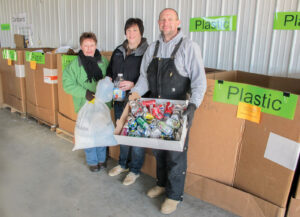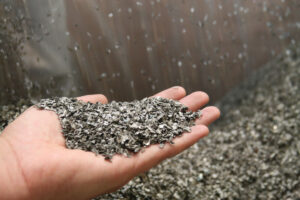Shelby Electric Cooperative
The Power of Green
 Shelby Electric Cooperative officially opened its Power of Green program July 10, 2010, in Shelbyville. “We saw a need and are filling it,” says Josh Shallenberger, COO at the cooperative. Among the items accepted are newspapers and magazines, office paper, steel and tin cans, aluminum cans, #1 and #2 plastics and corrugated cardboard.
Shelby Electric Cooperative officially opened its Power of Green program July 10, 2010, in Shelbyville. “We saw a need and are filling it,” says Josh Shallenberger, COO at the cooperative. Among the items accepted are newspapers and magazines, office paper, steel and tin cans, aluminum cans, #1 and #2 plastics and corrugated cardboard.
“It began with a grant from the Illinois Department of Commerce and Economic Opportunity to help fund the start up of the project,” says Kevin Bernson,Vice President of Media and Public Relations for the co-op. “Initially, we purchased the necessary bins, fencing and cameras.”
Dustin Theiss, Coordinator of Member and Media Services and part of the Power of Green Team, explains, “When we first started the program we had nice recycling bins outside, but we’ve grown so much we basically have the big cardboard boxes lined up on each side of the garage.”
“It gives more room for storage and ease of use for the recyclers. Plus, it provides a more weather-friendly place for the drop off of items and accommodates the cardboard binder for prepping all the cardboard boxes dropped off for pick up,” adds Chris French, PWR-net Customer Service Rep and part of the recycle team. Community Resource, a company out of Champaign drives a semi down to pick up what the community has donated.
It’s not only residents of the community, but the businesses who have taken advantage of the opportunity. In fact, 24 businesses use the recycling program. Monte McElroy, owner of McElroy Recreational Sales, is one example. He has used the Power of Green program since its inception, bringing paper and cardboard to recycle several times a month. “As a cooperative member it makes me proud to not only use this service for my business recyclables, but also proud that my cooperative cares about the communities in which they live and serve,” McElroy says.
For a complete list of both acceptable and unacceptable items go to: http://www.shelbyelectric.coop/Community/Recycling.asp
Rock Energy Cooperative
tons of recycling
In September 2012 Rock Energy Cooperative offered, for the first time, electronics recycling and document shredding during its Member Appreciation Day, in an effort to provide extra value to members. Barb Uebelacker, Communications Specialist for the co-op says, “The response was overwhelming. We had a record crowd with more than 1,200 people visiting our Janesville warehouse during the event. Those who brought recyclables generated a total of 6.7 tons of electronics for recycling and 2.5 tons of paper were shredded, all in less than three hours.”

Vehicles started lining up 15 minutes before the recycling began. In a team effort, co-op employees were assigned to help members carry their bags and boxes of documents to the shredding truck and unload heavy electronics from their vehicles. At the end of the event, there were 33 pallets filled with various types of electronics. The bulk of the 6.7 tons of electronics collected that morning were TVs of various shapes and sizes.
“The document shredding service provided at the event not only helped with recycling, but it also gave members the security of knowing that their personal information would not fall into the wrong hands,” Uebelacker notes.
Due to the overwhelming response in 2012, Rock Energy Cooperative decided to offer electronics recycling and document shredding again during its September 2013 event. “After members recycled 6.7 tons of electronics in 2012, we weren’t sure there would be many old TVs and computers left,” she says. “But the 2013 event set new records. We had 1,370 people in attendance, and 8.2 tons of electronics were recycled and 2.5 tons of paper were shredded.”
According to Uebelacker, because members took advantage of the recycling opportunities, they helped keep those used electronics out of the community landfills. “The items may not be valuable to us anymore because they’re broken or obsolete, but the products contain valuable resources. The metals, plastics and glass used in electronics require energy to mine and manufacture,” Uebelacker explains. “By recycling electronics and reusing the materials, we are conserving our natural resources as well as reducing the energy demands from mining and manufacturing.
Watch for details of the 2014 Membership Appreciation Days and recycle opportunities at www.rock.coop.
S.I.C. Recycling
family ties, early success
Why is it important to recycle scrap metal? It’s good for both the economy and the environment. The Institute of Scrap Recycling Industries, Inc., says, “Despite the sluggish economic recovery overall in the aftermath of the global recession, the U.S. scrap recycling industry rebounded from $54 billion in sales in 2009 to more than $90 billion in 2012. While the recovery in the U.S. labor market has been uneven, the scrap recycling industry has been at the forefront of job creation, adding more than 15,000 jobs to the economy since the beginning of 2010.”
 The industry is thriving and one new company in Illinois is experiencing the growth first-hand. S.I.C. Recycling, with 25 employees, is headquartered in Riverton. Brady Bird is the President/General Manager of the company and Rhett Schrock serves as Commodities Buyer/Marketing Manager. How did they start?
The industry is thriving and one new company in Illinois is experiencing the growth first-hand. S.I.C. Recycling, with 25 employees, is headquartered in Riverton. Brady Bird is the President/General Manager of the company and Rhett Schrock serves as Commodities Buyer/Marketing Manager. How did they start?
S.I.C. Recyling is a wholly-owned subsidiary of Sloan Implement Company, a family-owned, full-line John Deere dealership headquartered in Assumption, Ill. It is the primary family business, with nearly 400 employees serving 12 dealers in Illinois and five in Wisconsin. “We already have the best practices and philosophy modeled from our parent company,” says Bird. “We are guided by the core values and fundamentals that have driven the growth of Sloan Implement since its inception in 1931.” He credits owners Tom Sloan, CEO, and Larry Sloan, Chairman of the Board, for leading by example. Tom has two brothers, Craig Sloan and Jim Sloan. Jim is S.I.C.’s Operations Manager and Schrock’s step-father. Tom is Bird’s father-in-law and Schrock’s Uncle.
“In the mid 1970s the family started GSI Green Systems, Inc., and from there invested in a number of other manufacturing-based operations. That is the lineage of where we come from, who we are. About five years ago, Larry started Ecovery, LLC. His son, Kevin, is CEO of Ecovery. They started as electronic waste recoverers and then evolved. Three years ago they were looking for an expansion project to their facility. The family decided to put one in the Midwest,” says Bird. “So, we now have two separate business entities here sharing resources, and we have one common owner.
“We commenced operations in August of 2012 and in 2013 hit the ground running. We initially focused our effort on copper-aluminum radiators that come out of the HVAC market. Our equipment is all about size reduction and separation of equipment. Once we got that off the ground we added our expansion project, doubling our facility to 75,000 square feet. We will add a third shift to accommodate the recent expansion. Our plan has always been to grow, same as all of our family businesses.”
Technology drives the process, according to Bird. “It’s all about operational efficiencies, being able to quickly, safely, efficiently and effectively process and separate equipment. We test the materials for quality in our in-house lab.”
The company now specializes in copper and aluminum radiators, insulated copper wire and wire harnesses and aluminum-conductor steel-reinforced (ACSR) cable. According to Schrock, S.I.C. processes approximately three million pounds of material per month and has the capacity to process in excess of 30 million pounds annually. In addition to recycling, the company also produces #1 copper flake and chops, #2 copper chops, aluminum shred, Grad 1 aluminum briquettes and EC chops.
“We serve a 500-mile radius and are very niche by design,” Schrock says. “We now have the process for the ACSR in place, which opens up brand new markets with regard to finished product. We can source additional items from existing suppliers, scrap yards for example, for the radiators, and we buy from 28 states, where we can be competitive and freight isn’t a differentiating factor.”
“We constantly want to evolve and grow. Partnering with different organizations, like the Association of Illinois Electric Cooperatives helps expand that scope,” Bird says. “Cooperatives, municipalities and groups that generate that type of material make sense for us, but more importantly for those groups, to find cost-savings and value.”







